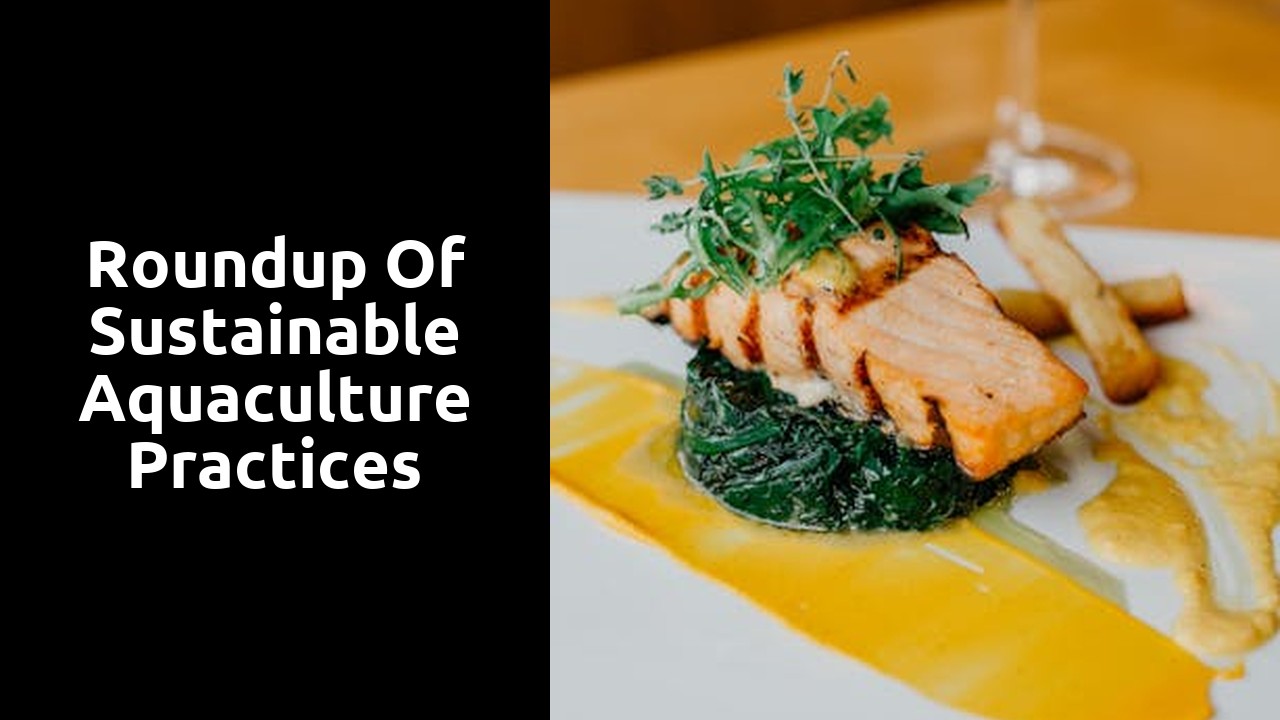Roundup of Sustainable Aquaculture Practices

Environmental Impact of Aquaculture
Aquaculture has undeniably contributed to the global demand for seafood. However, its growth has raised concerns about its environmental impact. One major issue is the discharge of effluents, such as uneaten feed and fish waste, into surrounding waters, leading to increased nutrient levels and possible algal blooms. These phenomena can disturb the balance of marine ecosystems and create dead zones where oxygen levels become critically low.
Moreover, the use of antibiotics and chemicals in aquaculture practices can have detrimental effects on marine biodiversity and create antibiotic-resistant strains of bacteria that pose risks to humans and animals. To address these challenges, sustainable aquaculture practices focus on minimising environmental impact through responsible waste management, reduced use of chemicals, and the promotion of naturally occurring biological controls. By adopting these practices, the aquaculture industry can work towards a more environmentally friendly and sustainable future.
Mitigating Pollution Risks
Aquaculture, like any other industry, has the potential to generate environmental pollution. This can result from the discharge of excess feed, waste products, and chemicals into the surrounding water bodies. To address this issue, aquaculture facilities are increasingly adopting best management practices to reduce their environmental impact. One effective method is implementing recirculating aquaculture systems that minimize water usage and waste discharge, thereby mitigating pollution risks to aquatic ecosystems.
Moreover, the use of probiotics and biofilters in aquaculture operations can help maintain water quality by breaking down organic matter and reducing harmful nutrient build-up. By actively monitoring water parameters such as oxygen levels, ammonia, and nitrate concentrations, aquaculture farmers can ensure a healthy environment for their aquatic organisms while minimising the risk of pollution. Embracing these sustainable practices not only benefits the local ecosystems but also enhances the long-term viability of the aquaculture industry.
Certification and Labelling Programs
Certification and labelling programs play a crucial role in ensuring the sustainability and transparency of aquaculture practices. Through these programs, consumers are provided with the necessary information to make informed choices about the seafood products they purchase. Industry-wide certifications, such as the Aquaculture Stewardship Council (ASC) and the Best Aquaculture Practices (BAP), set standards that promote responsible aquaculture practices, including environmental protection, social responsibility, and animal welfare.
By following these rigorous certification standards, aquaculture producers demonstrate their commitment to sustainable practices and adherence to strict guidelines. Consumers can trust that products carrying these certifications have been produced in an environmentally friendly manner that prioritises both the health of the oceans and the well-being of aquatic life. Furthermore, these certifications also help aquaculture businesses access new markets and showcase their dedication to sustainability, contributing to the overall reputation and competitiveness of the industry.
Organic Aquaculture Standards
Organic aquaculture standards play a crucial role in promoting sustainability within the aquaculture industry. These standards outline the practices and criteria that must be adhered to for a farm to be certified as organic. This certification signifies that the farming practices meet certain environmentally friendly and ethical requirements, ensuring that the seafood produced is both sustainable and of high quality.
Organic aquaculture standards typically include regulations regarding the sourcing of feed, the use of chemicals, antibiotics, and hormones, as well as the overall management of the aquatic environment. By following these standards, aquaculture farms can reduce their environmental impact, promote animal welfare, and provide consumers with a more transparent and trustworthy product. Moreover, organic certification can also lead to better market opportunities and higher prices for the products, incentivizing more farms to adopt sustainable practices.
Community Engagement in Aquaculture
Community engagement in aquaculture plays a crucial role in fostering sustainable practices within the industry. By involving local communities in decision-making processes and seeking their input, aquaculture facilities can ensure their operations align with the needs and values of the surrounding area. This collaborative approach not only promotes transparency but also builds trust and fosters a sense of ownership among community members, ultimately leading to more responsible and ethical aquaculture practices.
Furthermore, community engagement initiatives often involve educational outreach programmes that aim to raise awareness about the importance of sustainable aquaculture and the benefits it brings to both the environment and local economies. These programmes can include school visits, public seminars, and hands-on workshops that provide valuable information about the aquaculture industry and its impact on marine ecosystems. By empowering communities with knowledge and information, aquaculture facilities can work towards building a more informed and supportive network of stakeholders dedicated to promoting sustainable aquaculture practices.
Social Responsibility Initiatives
Another key aspect of sustainable aquaculture practices involves social responsibility initiatives. These initiatives are aimed at ensuring that the welfare and rights of workers within the aquaculture industry are protected. This includes promoting fair wages, safe working conditions, and access to training and education for workers involved in the production process.
Furthermore, social responsibility initiatives also extend to the communities in which aquaculture operations are located. Many aquaculture producers engage in community development projects, such as providing support for local schools, healthcare facilities, and infrastructure. By investing in the well-being of the local communities, aquaculture operations can foster positive relationships and contribute to the overall social and economic development of the regions in which they operate.
Related Links
Review of Aquaculture Certification and LabelingHow to Choose Sustainable Aquaculture Practices
5 Sustainable Aquaculture Practices You Should Know
The History of Aquaculture Practices
Why Aquaculture Environmental Impact Should Be Considered